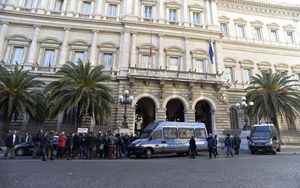(Finance) – 57% of the BTP Green in the period 2018-2021 was dedicated to investments in transport (7.62 billion), 15.2% for interventions on hydrogeological instability (2 billion), 12.2% toenergy efficiency (1.63 billion) while 9.4% of expenditure (1.25 billion euros) was allocated to research.
This is what emerges from the 2022 Allocation and Impact Report of the net proceeds collected through the BTP Green issues of 2021released from Ministry of Economywhich also reports an analysis of the programs and projects in the four-year period 2018-2021 and their relative weight on the total allocated.
In detail – explains the MEF – “on the total green expenses, during the four-year period 2018-2021 the transport category constitutes the main item (equal to 7.62 billion euros), representing 57% of the total. category is attributable to capital investments (railway infrastructures, electrification of railway sections, construction of new High Speed / High Capacity sections and contributions to support railway mobility) “.
“The second category of expenditure, in order of magnitude, is that concerning the protection of the environment and biological diversity, to which a share equal to 15.2% of the expenditure (approximately 2 billion euros) is destined. The category primarily includes interventions to protect the soil and against hydrogeological instability, investments in water infrastructures, as well as expenses for the construction of the Electromechanical Experimental Module (MO.SE) in Venice. A share equal to 12 was allocated to the category relating to energy efficiency , 2% of the total expenses reported (1.63 billion euros).
“At the Research 9.4% of the total expenditure was allocated (equal to 1.25 billion euros), where the resources disbursed to ENEA represent the most important item in the category. Finally, the measures for the prevention and control of pollution and the circular economy and the incentive measures for the production of energy from renewable sources constitute, respectively, 3.9% (525 million euros) and 2.2% (296 million euros). euro) of total green spending “.
Analyzing the‘environmental impact of the resources committed, the report shows that with the tax incentives for the production of electricity and thermal energy from renewable sources, the CO2 emissions avoided amounted to 2,439,839, 4,557,733 and 1,947,698 tons, respectively for the year 2018, 2019 and 2020. Tax incentives for building energy efficiency works helped to avoid the emission of over 283 thousand tons of CO2 in 2018 alone.
In the transport, “The HS / HC network has allowed, in many cases, a significant reduction in travel times, producing a modal shift from other modes of transport (eg road and air) with tangible benefits for the environment, linked to the reduction of CO2 emitted in the atmosphere “.
Finally, “a further significant use of the resources of green emissions is detectable for Marine Protected Areas, National Parks and State Natural Reserves”.
